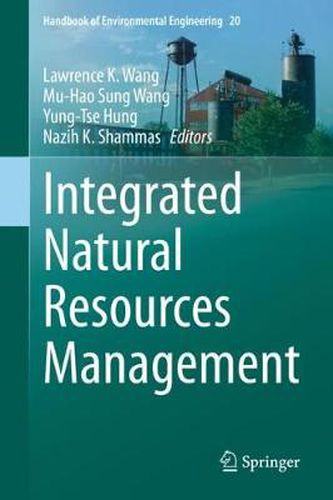Readings Newsletter
Become a Readings Member to make your shopping experience even easier.
Sign in or sign up for free!
You’re not far away from qualifying for FREE standard shipping within Australia
You’ve qualified for FREE standard shipping within Australia
The cart is loading…






This edited book has been designed to serve as a natural resources engineering reference book as well as a supplemental textbook. This volume is part of the Handbook of Environmental Engineering series, an incredible collection of methodologies that study the effects of resources and wastes in their three basic forms: gas, solid, and liquid. It complements two other books in the series including Natural Resources and Control Processes and Environmental and Natural Resources Engineering . Together they serve as a basis for advanced study or specialized investigation of the theory and analysis of various natural resources systems.
The purpose of this book is to thoroughly prepare the reader for understanding the topics of global warming, climate change, glacier melting, salmon protection, village-driven latrines, engineers without borders (USA), surface water quality analysis, electrical and electronic wastes treatment, water quality control, tidal rivers and estuaries, geographic information systems, remote sensing applications, water losses investigations, wet infrastructure, lake restoration, acidic water control, biohydrogen production, mixed culture dark anaerobic fermentation, industrial waste recycle, agricultural waste recycle, recycled adsorbents, heavy metals removal, magnetic technology, recycled biohydrogen materials, lignocellulosic biomass, extremely halotolerant bacterial communities, salt pan and salt damaged soil. The chapters provide information on some of the most innovative and ground-breaking advances in resources conversation, protection, recycling, and reuse from a panel of esteemed experts.
$9.00 standard shipping within Australia
FREE standard shipping within Australia for orders over $100.00
Express & International shipping calculated at checkout
Stock availability can be subject to change without notice. We recommend calling the shop or contacting our online team to check availability of low stock items. Please see our Shopping Online page for more details.
This edited book has been designed to serve as a natural resources engineering reference book as well as a supplemental textbook. This volume is part of the Handbook of Environmental Engineering series, an incredible collection of methodologies that study the effects of resources and wastes in their three basic forms: gas, solid, and liquid. It complements two other books in the series including Natural Resources and Control Processes and Environmental and Natural Resources Engineering . Together they serve as a basis for advanced study or specialized investigation of the theory and analysis of various natural resources systems.
The purpose of this book is to thoroughly prepare the reader for understanding the topics of global warming, climate change, glacier melting, salmon protection, village-driven latrines, engineers without borders (USA), surface water quality analysis, electrical and electronic wastes treatment, water quality control, tidal rivers and estuaries, geographic information systems, remote sensing applications, water losses investigations, wet infrastructure, lake restoration, acidic water control, biohydrogen production, mixed culture dark anaerobic fermentation, industrial waste recycle, agricultural waste recycle, recycled adsorbents, heavy metals removal, magnetic technology, recycled biohydrogen materials, lignocellulosic biomass, extremely halotolerant bacterial communities, salt pan and salt damaged soil. The chapters provide information on some of the most innovative and ground-breaking advances in resources conversation, protection, recycling, and reuse from a panel of esteemed experts.